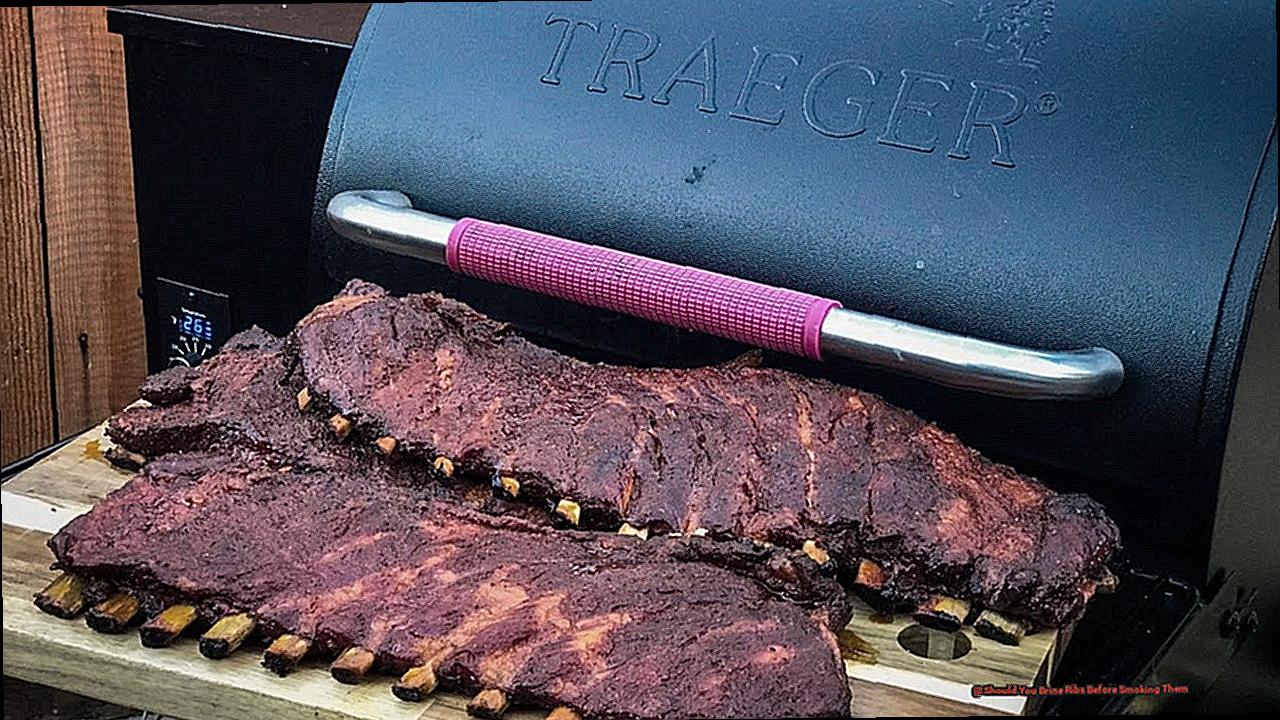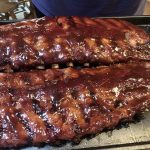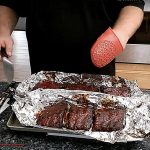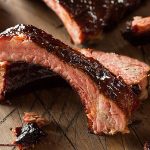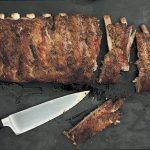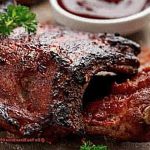Do you find yourself constantly disappointed with dry and bland ribs? Look no further, my friend, because I have the ultimate solution for achieving succulent and flavorful ribs every time – brining. That’s right, the simple act of soaking your ribs in a saltwater solution before smoking them can make all the difference. But don’t just take my word for it, let me break it down for you with some mouth-watering bullet points:
-
- Brining infuses your ribs with flavor from the inside out.
- It helps to retain moisture, resulting in tender and juicy meat.
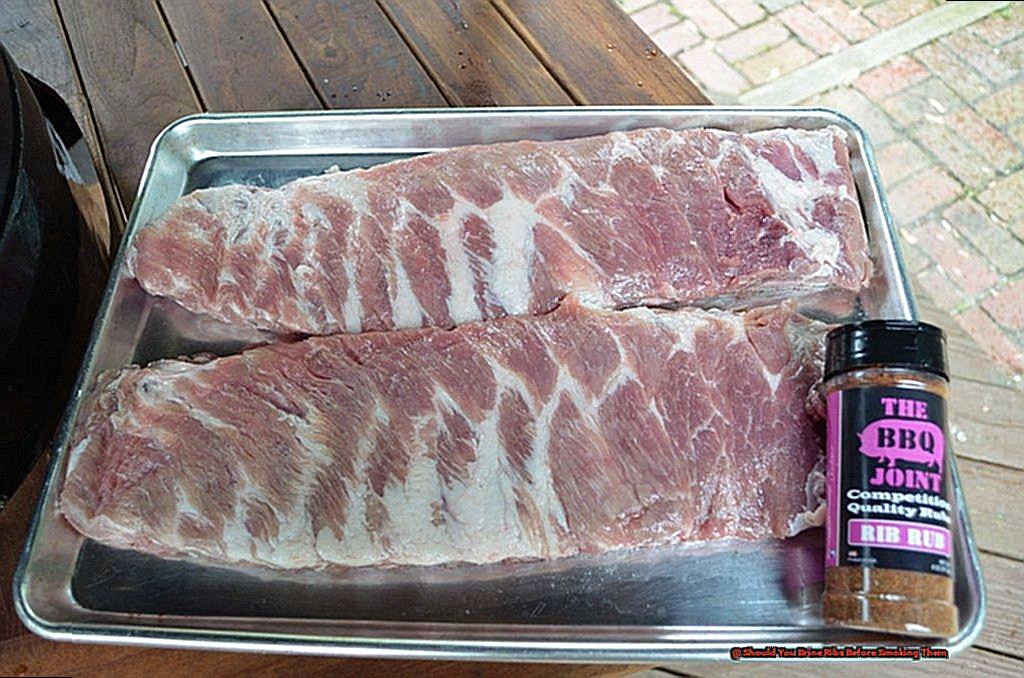
- Brining also acts as a natural tenderizer for tougher cuts of meat.
- You have the freedom to customize your brine with your favorite herbs, spices, and seasonings.
- This foolproof technique is easy enough for beginners to master.
But that’s not all – brining not only elevates the taste and texture of your ribs but also saves you time on cooking. So why settle for mediocre ribs when you can achieve restaurant-worthy perfection? Trust me; your taste buds will thank you.
So, grab a pen and paper because I’m about to share my go-to brine recipe in this blog post. Get ready to take your rib game to the next level.
Contents
What Is Brining?
Brining is the process of submerging meat in a saltwater solution or rubbing it with a salt mixture before cooking. This technique can significantly improve the flavor and tenderness of smoked ribs by breaking down muscle fibers and keeping the meat moist throughout the cooking process.
There are two main types of brining: wet and dry. Wet brining, which involves soaking the ribs in a saltwater solution with additional ingredients, is generally more advantageous as it adds unique flavors and maintains moisture in the meat.
Meanwhile, dry brining requires rubbing salt onto the ribs and letting them rest in the fridge for an hour or two. Both methods offer their own benefits, but wet brining typically yields better results. It is recommended to wash off any excess brine from the ribs before cooking to avoid them becoming overly salty.
Brining is a popular and highly effective technique used by BBQ enthusiasts to elevate the taste and texture of ribs, and I highly recommend giving it a try for anyone looking for tender and juicy meat.
Brining may seem like a complicated process, but it’s actually quite simple once you understand the basics. As a BBQ enthusiast myself, I’ve experimented with different brining methods and have found that wet brining works best for me. One of my favorite recipes involves soaking the ribs in a mixture of salt, brown sugar, apple cider vinegar, and spices overnight before smoking them to perfection. The results are always mouth-watering, with perfectly tender and juicy ribs bursting with flavor.
However, if you’re short on time or don’t have all the necessary ingredients, dry brining can still be a great option. I recommend using a coarse salt to rub onto the ribs, as this will help draw out moisture and add flavor without making them too salty. It’s also important to let the ribs sit in the fridge for at least an hour to allow the salt to do its magic.
In conclusion, brining is a simple yet effective technique that can take your ribs to the next level. Whether you prefer wet or dry brining, both methods can significantly enhance the taste and tenderness of your meat. So why not give it a try and see the difference for yourself?
Is It Worth Brining Ribs?
The answer is a resounding yes. Brining ribs has numerous benefits that make it a worthwhile step in the smoking process. From tenderizing the meat to adding flavor and reducing cooking time, brining can elevate the flavor and texture of your ribs. Let’s take a closer look at the potential benefits of brining ribs in this comprehensive table.
| Benefits of Brining Ribs | Description |
| Tenderizes the meat | Brining helps to break down the muscle fibers in the ribs, making them more tender and easier to eat. |
| Prevents dryness | Brining adds moisture to the meat, preventing it from drying out during the smoking process. |
| Adds flavor | The salt and other seasonings in the brine can penetrate the meat, enhancing its natural flavor and adding new dimensions to the taste. |
| Reduces cooking time | Brining can help to speed up the cooking process by pre-tenderizing the ribs, resulting in shorter smoking times. |
| Enhances creativity | The act of brining ribs allows for experimentation with different flavors and seasonings, adding a creative touch to your cooking. |
| Promotes versatility | Brining can be used for various types of ribs, making it a versatile technique that can be adapted to different cuts of meat. |
| Requires patience | While brining may take some extra time and effort, it is worth it for the tender, juicy results it produces. |
However, like any cooking technique, there are potential drawbacks to brining ribs. Over-brining can result in an overly salty taste and a change in texture. It is important to carefully follow the recommended brining times and to adjust seasoning levels accordingly.
Additionally, brining may not be suitable for all types of ribs, so it is important to research and experiment with different methods for different cuts of meat.
How Can You Brine Ribs?
When preparing ribs for smoking, it is best to brine them beforehand. This involves creating a saltwater solution or dry rub, soaking the ribs in it for a recommended amount of time, and then cooking them according to your preferences. This method is known for adding moisture, tenderness, and flavor to your ribs.
To properly brine ribs before smoking, follow these steps:
- Decide on wet or dry brining: As noted in the research, there are two types of brining – wet and dry. Wet brining entails placing the ribs in a saltwater solution with additional ingredients such as sugar, herbs, or spices. Dry brining involves rubbing a mixture of salt and seasonings onto the ribs.
- Prepare the brine: For wet brining, create a saltwater solution by dissolving salt in water over medium heat. Add in any desired ingredients like sugar, herbs, or spices for added flavor. For dry brining, simply mix together salt and other seasonings.
- Brine the ribs: Place the ribs in a large container or resealable bag and pour the prepared brine over them. Ensure that the ribs are fully submerged in the solution. For wet brining, refrigerate for 4-6 hours (overnight is recommended for optimal results). For dry brining, refrigerate for at least an hour before cooking.
- Rinse and pat dry: Once the recommended brining time has passed, remove the ribs from the brine and rinse them thoroughly under cold water. Pat them dry with paper towels.
- Cook to your liking: After brining, you can cook the ribs as desired – whether that be through smoking, grilling, or baking. Keep in mind that wet-brined ribs may take longer to cook due to their already moist nature.
Brining is an excellent step to consider before smoking ribs. It adds moisture, tenderness, and flavor to your meat, making it a popular method among BBQ enthusiasts. Whether you choose to wet or dry brine, the process is simple and can greatly enhance the taste and texture of your ribs.
Conclusion
In conclusion, brining is the key to achieving mouth-watering and delectable ribs every time. This simple yet effective technique infuses your ribs with flavor from the inside out, resulting in tender and juicy meat that will leave you wanting more. Not only does it enhance the taste, but it also helps to retain moisture for a succulent texture.
Additionally, brining acts as a natural tenderizer and allows you to get creative by customizing your brine with your favorite herbs, spices, and seasonings. It’s a win-win situation that not only elevates your ribs but also saves you time on cooking.

